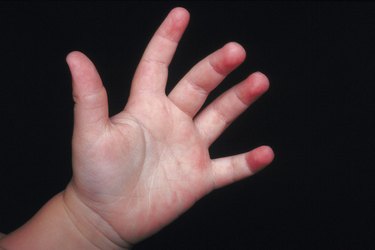
Parents are often frightened when they notice their child's hands shaking. However, this symptom rarely indicates a serious underlying condition. Shaking hands are normally caused by tremors, involuntary muscle movements that are similar to twitches. If the shaking continues for several days or continues coming back, consult your child's pediatrician to rule out any serious medical conditions.
Anxiety
Video of the Day
Many children, especially very young kids, struggle to express their feelings verbally. Instead, their emotions may manifest physically. Most children experience moderate anxiety from time to time, and the causes can range from fights with friends to serious problems in the family. If your child is experiencing anxiety, her body may tense up and then begin shaking. This shaking is especially noticeable in the hands. Encourage your child to talk about her feelings and, if the anxiety continues, consult your pediatrician.
Video of the Day
Hunger
Malnourishment, skipped meals and simple hunger can all cause low blood sugar. When the blood sugar remains low, children may experience tremors in their hands. Encourage your child to eat a healthy, balanced diet. If the tremors continue regardless of food intake, have your child tested for diabetes.
Caffeine
High doses of caffeine frequently cause hand tremors in adults. Children are even more susceptible to the effects of caffeine, and even one soda is enough to induce a tremor. Caffeine is not a healthy choice for children, and may stunt growth. Give your child water and unsweetened juice instead of soda and tea.
Muscle Problems
Because tremors are caused by involuntary muscle movements, some muscle problems increase the likelihood of tremors. Muscular weakness and exhaustion are especially likely to cause shaking hands. Encourage your child to stretch before exercising, to avoid overworking muscle groups and to take frequent breaks.
Dehydration
Dehydration may cause a variety of involuntary muscle movements, including tics, spasms and tremors. Limit your child's consumption of sugary drinks, which can cause dehydration and encourage her to drink lots of water.